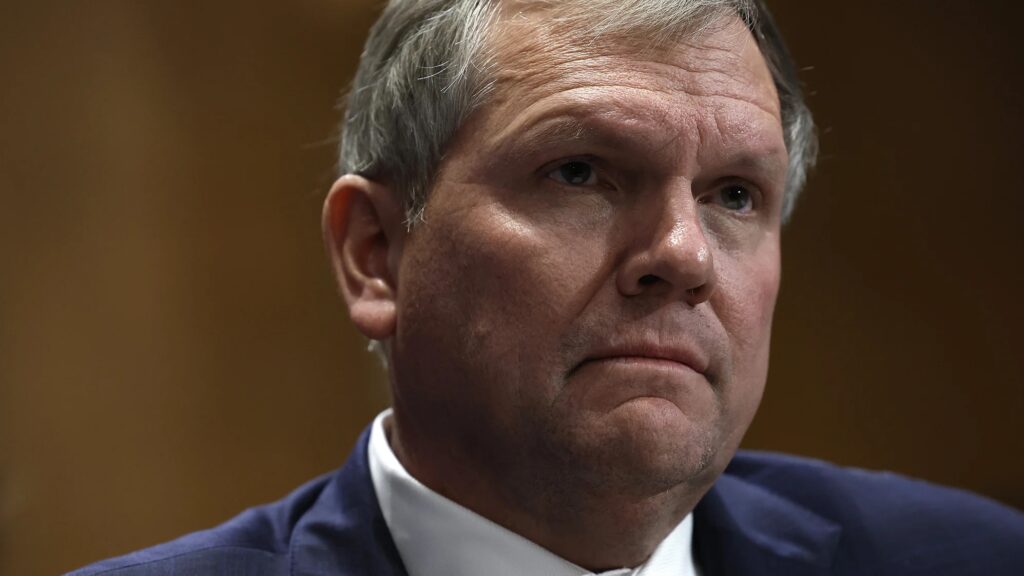
Getty Images
Norfolk Southern’s board fired CEO Alan Shaw on Wednesday night, citing his “consensual relationship” with the company’s chief legal officer, who was also fired.
Shaw was fired “for cause,” according to a statement released by the company Wednesday. That could mean he won’t be eligible for the usual severance package that chief executives receive when they’re fired.
The company originally disclosed on Sunday that Shaw was the subject of the investigation.
Shaw served as CEO of one of the four largest freight railroads in the country for a little over two years. However, it was a tumultuous tenure that included proxy battles with an activist shareholder group that wanted to replace Shaw, contentious labor negotiations that nearly led to a strike that hurt the economy, a major derailment in East Palestine, Ohio, that released tank cars full of toxic substances into a small Ohio town, leading to health concerns, and complaints about ongoing symptoms among some residents.
Shaw survived the shareholder vote but could not escape scrutiny over his personal behavior.
In light of the preliminary findings of the board’s ongoing investigation, the business announced that Nabanita Nag has been removed from her positions as executive vice president of corporate affairs, chief legal officer, and corporate secretary with immediate effect. It was announced that the company’s CFO, Mark George, will become its new CEO.
The chairman of the Norfolk Southern Board, Claude Mongeau, stated, “The Board has full confidence in Mark and his ability to continue delivering on our commitments to shareholders and other stakeholders.”
There was no acknowledgement in the company’s announcement for Shaw’s thirty years of service, nor was there a statement from Shaw, whom CNN was unable to get in contact with for comment. According to his official business biography, Shaw began working for the corporation in 1994 as a cost systems analyst and gradually advanced into positions of more responsibility.
While the railroad’s powerful Brotherhood of Locomotive Engineers and Trainmen union, as well as the union representing track maintenance workers, opposed Shaw and Norfolk Southern management during a shareholder proxy fight earlier this year, other unions supported Shaw. And some past critics of the railroad praised him for steps he took after the February 2023 derailment in East Palestine to improve the railroad’s safety.
During the proxy war, Administrator Amit Bose of the Federal Railroad Administration, the nation’s rail regulator, wrote a letter praising the railroad’s improvements under Shaw. He said the steps were “significant and demonstrate the potential for progress when railroads prioritize safety.” And he noted that NS was the only Class I railroad to significantly reduce its rate of mainline derailments last year.
Shareholders ultimately decided to support Shaw, who was re-elected to the board with 64% of the vote. Most of Norfolk’s list of director candidates also were elected, although three candidates proposed by Ancora, the activist investor group that sought his ouster, also won election to the board.
Nevertheless, Jennifer Homendy, chairwoman of the National Transportation Safety Board, which investigated the accident, strongly criticized Norfolk’s actions. She said Norfolk Southern’s actions put first responders and neighbors of the derailment site at unnecessary risk after the derailment. And she said Norfolk’s actions during the investigation process were “unprecedented and reprehensible.”
The NTSB investigation found that the cause of the derailment was a failure of an axle on one of the cars, which caught fire and caused the derailment without giving crew members enough warning to stop the train in time.
Although the safety agency did not criticize NS for its actions prior to the accident, it did criticize NS for its actions in the hours and days that followed. In particular, NS was criticized for not providing first responders on the scene with adequate information about the safety hazards they faced and for choosing to burn five tank cars full of toxic vinyl chloride under controlled conditions.
Due to concerns expressed about the possibility of an undetected explosion, a controlled burn was conducted three days after the incident. However, the NTSB investigation found that it was impossible that such an explosion could have occurred by then due to the circumstances, and that Norfolk Southern officials failed to properly inform public officials of this fact at the time of the decision to conduct a controlled burn.
How did you like this article? You can tell us by commenting. Always stay with us for information about the country and the world.




